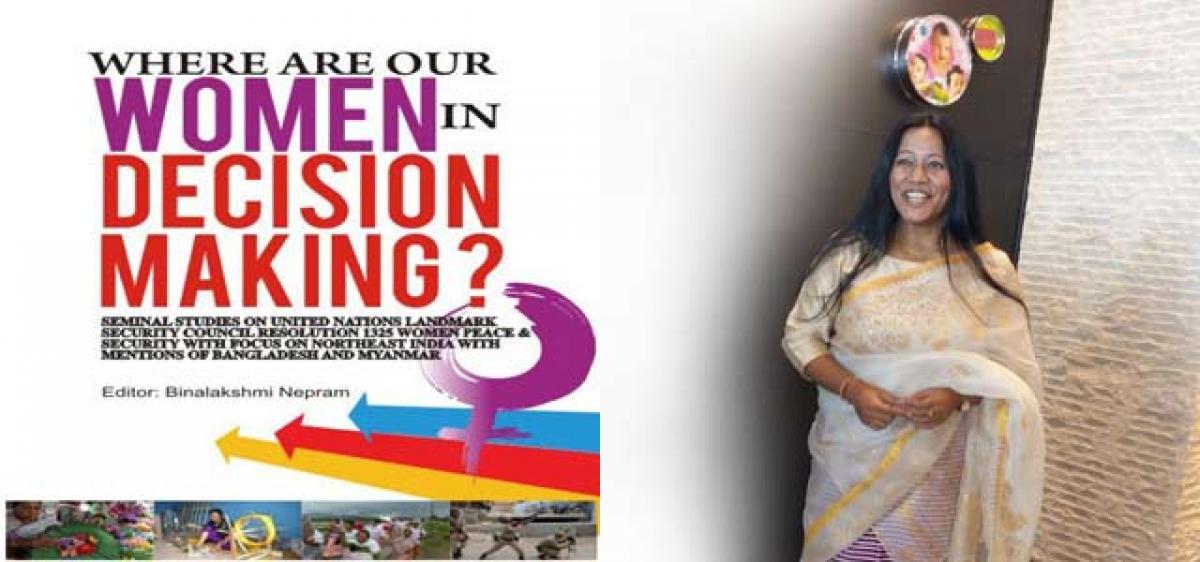Live
- All you need to know about PAN 2.0
- Akasa Air redefines travel experience with industry-first offerings
- MP: Residents stage protests against liquor shop in Indore
- Telugu Actor Shri Tej Booked for Alleged Cheating and False Promise of Marriage in Live-in Relationship
- Toyota Kirloskar Motor Celebrates 1 Lakh Urban Cruiser Hyryder on Indian Road
- MLS: New York City FC part ways with head coach Nick Cushing
- Delhi CM says Centre cutting AAP voters’ names from rolls, BJP hits back
- Hyderabad Metro Rail Phase-II Works to Begin in Old City in January 2025
- Odisha: 668 persons killed in human-elephant conflicts in last three years
- DEFENDER JOURNEYS: TO EMBARK ON ITS THIRD EDITION FROM NOVEMBER 2024
Just In

Her objective is to end gun culture and bring peace in her home state Manipur in particular and the Northeast in general. For her contributions in this field to Manipur and the Northeast she is known by the epithet ‘The Face & Voice of North-East’.
Binalakshmi Nepram is a humanitarian, author, activist in the advocacy of gender-rights and women-led disarmament movements.
Her objective is to end gun culture and bring peace in her home state Manipur in particular and the Northeast in general. For her contributions in this field to Manipur and the Northeast she is known by the epithet ‘The Face & Voice of North-East’.
Binalakshmi founded the ‘Manipur Women Gun Survivors Network’ and she is the secretary general of Control Arms Foundation of India.
Excerpts
What made you take up activism?
If we see injustice and wrong happening around us some people cannot keep quiet. It’s as simple as that. People either pretend not to see or ignore it and life goes on. But some of us cannot pretend and are extremely mindful about the happenings. That is why I joined activism.
You have seen violence day in and day out, so how did you cope with it?
You know, the human mind is a very powerful; you face challenges time and again; but it's your mind that keeps you calm and alright.
What was the reason behind starting your NGO?
I grew up in Manipur, where 20,000 people are killed in the ongoing violence. We have 60 armed groups and one lakh Indian armed forces operating in my area. I have grown up seeing only guns and men with guns. I have always seen mothers surviving after the death of children, it’s painful. I have seen massacres and I have stopped my morning walks after seeing that. This trauma lives in you and two things can happen to you; either you get depressed or you fight back. So we fought back, which is peaceful and non-violent. This is why we set up this organisation in 2004. It has been 10 years now and the journey is still going on.
Tell us about the works of your organisation.
We help the less fortunate people or the people who are grieving because of the loss of their dear ones. Believe me, they get strength when we counsel, or help them and by that, we also get the strength to continue.
That’s how our work got proliferated all across 300 villages in the North-East. We travel village after village and now we have a huge amount of work going on in Manipur and beyond. In all the seven Northeastern states we have set up five women support centres. In Tripura, Bangladesh border and in Myanmar border we set up one centre recently. We also started a centre in New Delhi. When a woman undergoes some kind of trauma there is not a single place where she can go for counseling. So we have set up these women support centres to tell women that here is a place for them and they can come here anytime.
Have you personally faced any violent incident?
Every person in Manipur has a family, who has suffered losses. My 14-year-old niece died in a bomb blast and interestingly she went for badminton practice early morning. Every one of us has stories and we have gone through some or other kind of pain.
What problems you faced when you started?
One becomes fearful if one has a personal agenda. For us, humanitarian work is our agenda. We do not take sides. Whether it’s a killing by military or extremists we do not take sides. After the killing, we take the survey of the family.
We see the parameters like – Are they poor? Are they surviving? Are their children going to school after the loss of their family members? We look into giving an instant healing to people. As a result of this the Union government, earlier, thought that I was propagating insurgency propaganda. After many years I told them to open a file and check our mails because we have nothing to hide. In 2003 we started talking about violence. In 2011 we won CNN-IBN ‘Real Heroes’ award.
Tell us about your book?
Our new book ‘Where are our Women in Decision Making?’ showcases that our women are in the decision-making process. It was released recently and we have provided a blueprint on how India should have a national plan on women safety and security.
How supportive is your family about your work?
It’s not easy leading a life as an activist. But my destiny is committed to where I’m. My family members are constantly worried about me. It’s very important to honour and respect each other’s work.

© 2024 Hyderabad Media House Limited/The Hans India. All rights reserved. Powered by hocalwire.com







